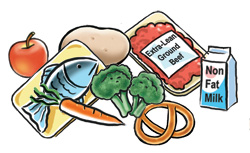A low-fat diet can help you lose weight. It also can help lower cholesterol and prevent symptoms of gallbladder disease. In addition, choosing healthier unsaturated fats over less saturated healthy fats can help improve heart health. The average American diet contains up to 50% fat. This means that half of all calories come from fat (about 80 grams to 100 grams of fat per day). Choosing normal portions of foods from the list below can help lower your fat intake. Experts recommend that only 20% to 35% of your daily calories come from fat. The remaining 65% to 80% of calories will come from protein and carbohydrates.
Breads
OK: Whole-wheat or rye bread, graham or soda crackers, melba toast, plain rolls, whole-wheat bagels, English muffins.
Don't have: Rolls and breads containing whole milk; waffles, pancakes, biscuits, cornbread; cheese crackers, other flavored crackers, pastries, doughnuts.
Cereals
OK: Oatmeal, whole-wheat, bran, multigrain, rice.
Don't have: Granola or other cereals that have oil, coconut, or more than 2 grams of fat per serving.
Cheese and eggs
OK: Cheeses labeled low-fat; 3 whole eggs per week; egg whites and egg substitutes as desired.
Don't have: All other cheeses.
Desserts
OK: Gelatin, slushy, angel food cake, meringues, nonfat yogurt and pudding, sherbet made with nonfat milk.
Don't have: Any other store-bought desserts, or desserts that have fat, whole milk, cream, chocolate, and coconut. Try to limit sweets and desserts. They may also contain high amounts of added sugars.
Drinks
OK: Nonfat milk, coffee, tea, water.
Don't have: Whole and reduced-fat milk, evaporated and condensed milk, hot chocolate mixes, milkshakes, malts, eggnog.
Fats
OK: You may have up to 3 teaspoons of fat daily. This can be butter, margarine, mayonnaise, or healthy oils (canola or olive).
Don't have: Cream, nondairy creams, cream cheese, gravies, and cream sauces.
Fruits
OK: Most fruits and fruit preparations made with no or low amounts of fat and added sugar.
Don't have: Coconut, olives.
Meats, poultry, fish
OK: Limit meat to 6 ounces daily (broiled, roasted, baked, grilled, or boiled). Buy lean cuts and trim off the fat. Try beef, fish, lamb, pork, and canned fish packed in water; also, chicken and turkey with the skin removed.
Don't have: Fried meats, fish, or poultry; fried eggs, and fish canned in oils; fatty meats, such as bacon, sausage, corned beef, hot dogs, and lunch meats; meats with gravies and sauces.
Potatoes, beans, pasta
OK: Dried beans, split peas, lentils, potatoes, rice, pasta made without added fat.
Don't have: French fries, potato chips, potatoes prepared with butter, refried beans.
Soups
OK: Clear broth soups without fat and with allowed vegetables.
Don't have: Cream-based soups.
Vegetables
OK: Fresh, frozen, canned or dried vegetables, all made without added fat.
Don't have: Fried vegetables and those prepared with butter, cream, sauces.
Other foods
OK: Salsa, spices and herbs, mustard, ketchup, lemon, and vinegar. Though some foods like sugar, jelly, hard candy, marshmallows, honey, syrup, and salt contain no fat, it's still a good idea to watch portion sizes. The Dietary Guidelines for Americans recommend that less than 10% of daily calories come from added sugars.
Don't have: Chocolate, nuts, coconut, and cream candies; sunflower, sesame, and other seeds; fried foods; cream sauces and gravies; pizza.


